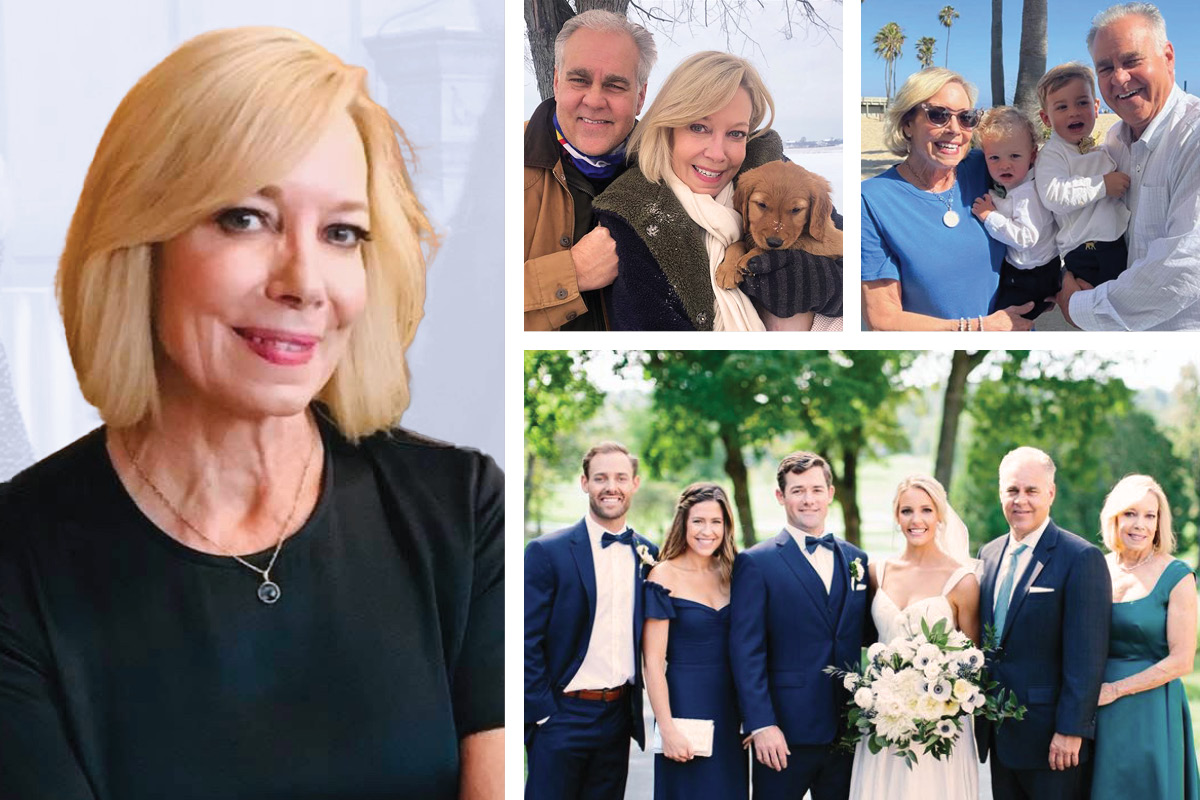
A Million Dollars for Breast Cancer Care
In a remarkable act of generosity, the family of David and Katie Parkhill has committed $1 million to establish the Katie Parkhill and Family Fund at Mills Breast Cancer Institute. This significant gift, announced during Breast Cancer Awareness Month as part of The Campaign for Carle Health, aims to revolutionize breast health services and provide unparalleled support to patients and their families.
Made in loving memory of Katie Parkhill, who bravely faced her own breast cancer journey, the donation will advance diagnostic and surgical technology, expand nurse navigator support, and enhance patient-centered services at the institute. Katie's experience highlighted the vital role of innovative imaging, personalized care coordination and compassionate support in the healing process. The Parkhill family's generosity ensures that future patients will benefit from these essential resources, helping others navigate their own cancer journeys with hope and strength.
"Through Katie's journey, we witnessed the extraordinary difference that advanced technology and a compassionate team can make," David Parkhill said. "Our family is humbled to honor Katie in this way – by helping others who will walk the path she walked. This gift is our promise that her legacy will live on at Mills Breast Cancer Institute, bringing comfort and care to countless families."
The newly established Katie Parkhill and Family Fund will:
- Expand access to state-of-the-art diagnostic imaging technology, including 3D mammography and advanced breast-imaging tools.
- Acquire leading-edge surgical technology to reduce patient discomfort and surgical time, and improve outcomes.
- Grow the breast cancer nurse navigator program, ensuring patients receive individualized guidance, emotional support and care coordination throughout their treatment.
Sinisa Stanic, MD, Carle Cancer Institute medical director, emphasized the importance of this investment. "Katie touched so many lives with her courage and grace. The Parkhill family's gift is truly transformational. It allows us to strengthen cancer care in ways that matter most – providing advanced technology and personal support that improves outcomes and gives patients comfort and confidence."
This donation is a lead gift to The Campaign for Carle Health, a $60 million comprehensive campaign to advance healthcare innovation, expand access and transform patient experiences across the Carle Health system.
"Philanthropy like this is truly transformational," said Angie Hatfield Marker, executive director of development and campaigns. "The generosity of the Parkhill family not only honors Katie's life, but also ensures patients in our communities have access to the best technology, latest treatment and most compassionate care. It’s a powerful reminder of how giving can change lives today and for generations to come."
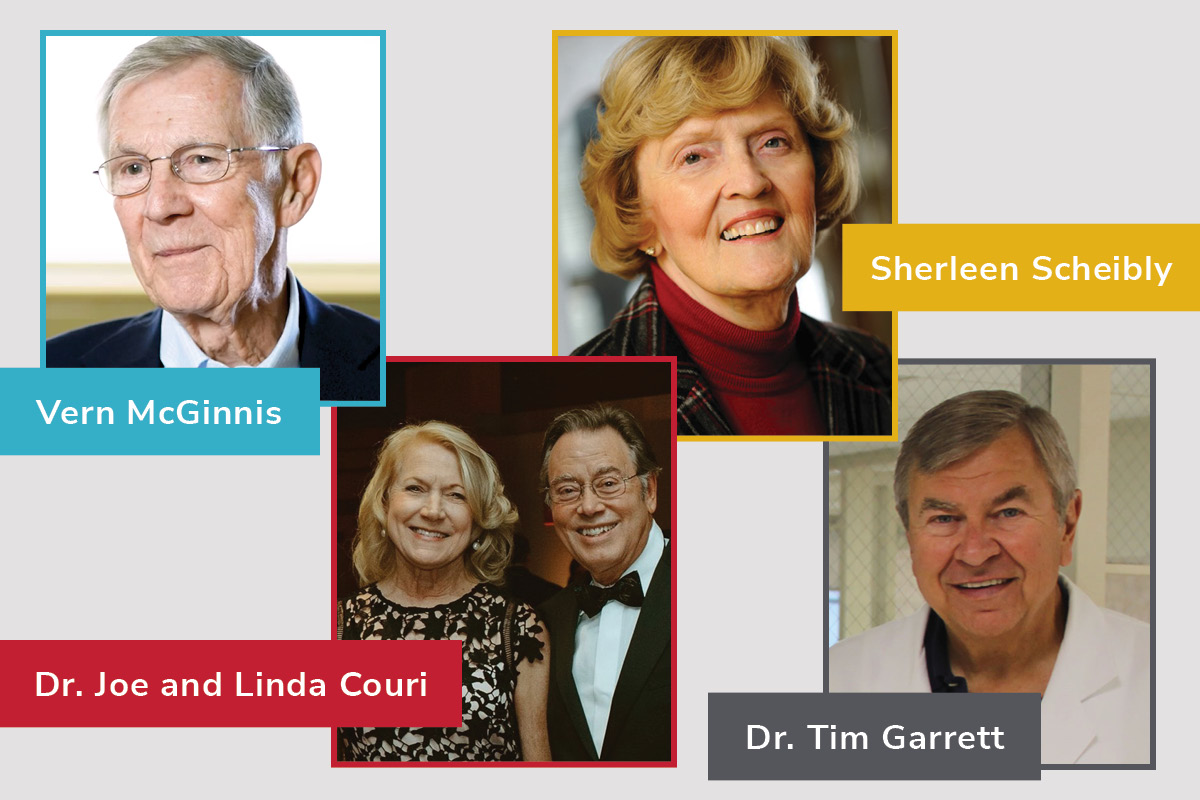
Celebrating Our 2025 Cornerstone Award Recipients
Carle Health Center for Philanthropy is proud to announce the 2025 Cornerstone Award recipients – individuals whose dedication and generosity have helped build the foundation of healthcare in our communities. These honorees embody the spirit of philanthropy and service that defines Carle Health. Their stories inspire us all to continue building a stronger, healthier future for our communities.
Vern McGinnis: Bloomington-Normal Service Area
For over 20 years, Vern McGinnis has been a steadfast supporter of Carle BroMenn Medical Center. His commitment – both in time and financial resources – has helped Carle Health achieve milestones that would’ve been impossible without his support. Vern served on the BroMenn Regional Healthcare System Board of Trustees and chaired the Foundation Board, leading the capital campaign for the 2012 hospital addition. Under his leadership, the campaign raised over $10 million toward a $53 million project. In recognition of his dedication, Vern was named the 2025 Cornerstone Award recipient for the Bloomington-Normal Service Area.
Sherleen Scheibly: Champaign-Urbana Service Area
When Sherleen Scheibly joined Carle Health as a nurse anesthetist, she never imagined she’d spend 39 years shaping the organization’s history. Sherleen assisted Dr. Michael Novak in performing Illinois’ first cochlear implant in 1984. In 2008, she made a philanthropic gift to support a new building for children with hearing loss, naming a room in the facility. Sherleen also helped establish the Women’s Legacy Circle and recently joined the Margaret Carle Morris Society by including Carle Health in her estate plans. Her enduring commitment as a nurse and philanthropist earned her the 2025 Cornerstone Award for the Champaign-Urbana Service Area.
Dr. Joe and Linda Couri: Greater Peoria Service Area
Dr. Joe Couri is a retired rheumatologist and lifelong Peorian who served Methodist Medical Center for 36 years. He’s held leadership roles in medical organizations, earning awards for clinical excellence and community services. For 12 years, he served our West Region Philanthropy Council. Joe’s also known for his achievements in music and photography. Linda Couri, a retired speech pathologist with 28 years of experience in public schools, is an active community volunteer and leader in several organizations. Her interests include gardening, reading, travel and photography. Together, Joe and Linda are dedicated to family and community service in Peoria.
Dr. Tim Garrett: Olney Service Area
For over 40 years, Dr. Tim Garrett has served patients at Carle Richland Memorial Hospital, Carle West Salem and Carle Olney. Dr. Garrett’s support for the Greatest Needs Fund, Olney Hospice, Employee Giving campaigns and the COVID-19 response exemplifies his tireless dedication to the health and well-being of others. He is the 2025 Cornerstone Award recipient for the Olney Service Area.
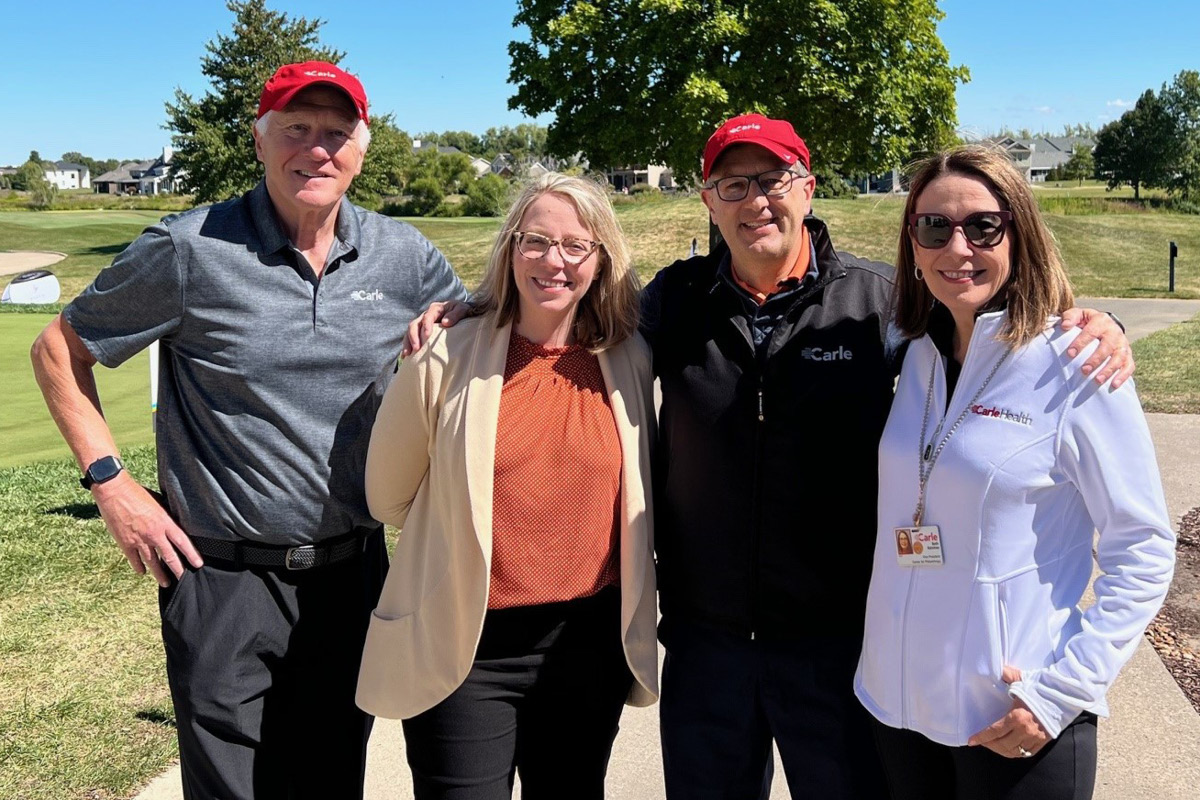
When Golf Transforms Healthcare
The 2025 Carle Health Golf Open may be over, but the work has just begun. Thanks to our generous sponsors and enthusiastic golfers, more than $407,000 was raised to enhance emergency and trauma services at Carle Foundation Hospital. Those dollars will help expand the footprint of the Emergency Department and enhance the patient experience for those who count on us. The 2026 golf open will tee off September 13-14. We can’t wait to continue the tradition.
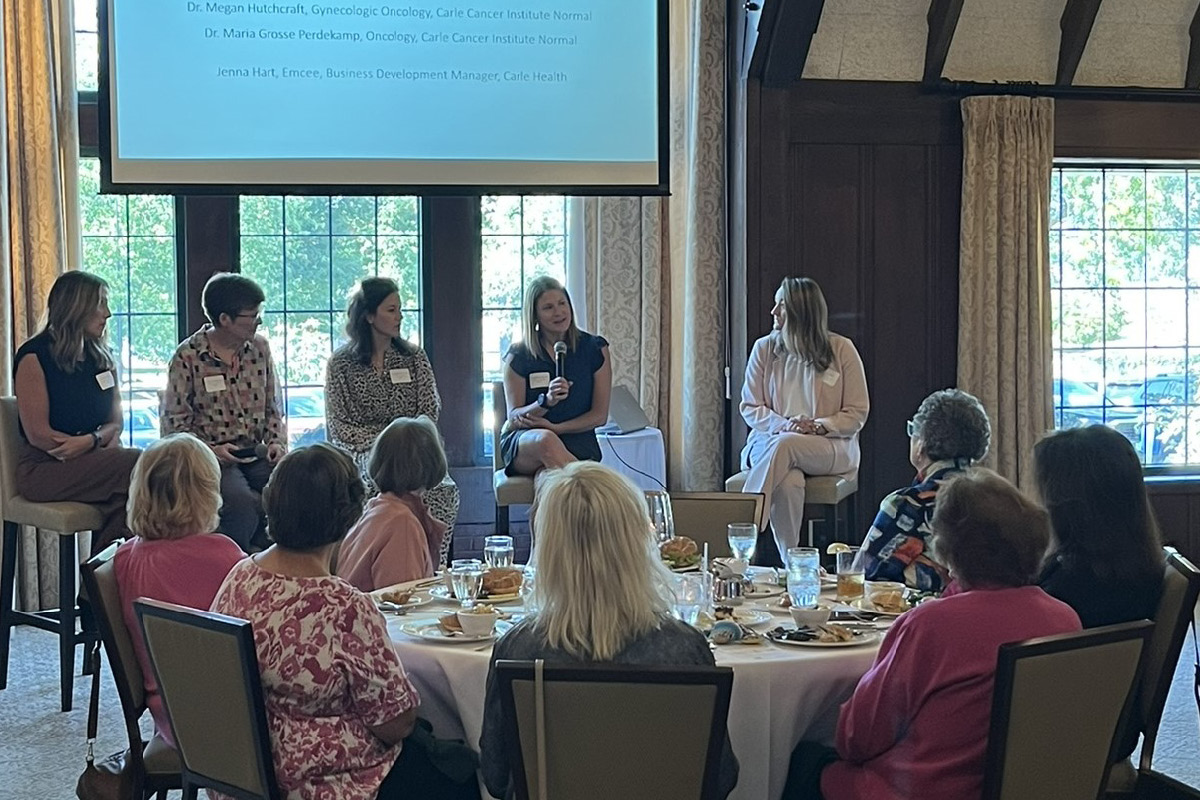
Luncheon raises funds for new breast cancer tool.
Matilde Francois, MD, remembers the days before radar location, when breast tumors were marked with a guidewire. The small wire was anchored in the tumor and protruded from the breast. And it was a major hassle for patients.
“They’d be sitting there for an hour and a half with a wire sticking out and a cup on their breast, knowing already that they have breast cancer and they’re going to have surgery,” said the Carle Health oncology surgeon. “It was just one inconvenience after another when you already don’t feel good.” And because the wire had to be inserted on the day of the procedure, it also created scheduling issues that limited how many patients could be treated.
Radar location changed that, allowing surgeons to use a simple probe to detect a tiny transmitter that can be implanted in the tumor up to a month before surgery. This innovation eliminated the need for patients to be at the hospital hours before surgery and allowed more patients to be treated sooner.
Over the last two years alone, the Radiology department at Carle Health has placed over 445 clips to allow localization for surgeries performed by Dr. Francois, making it a valuable tool for surgical breast procedures. And now, this system is getting a major upgrade. Thanks to an $80,000 gift, made possible by the Connie Wey Breast Health Services Fund, radar localization is becoming more versatile.
The new system, which should arrive sometime next year, features clips with four different radar signatures that can each be detected by the probe. This will enable more precise tumor-margin mapping, multiple-lesion location and localization of lesions that are only visible through MRI imaging. It's a small change that will make a big improvement.
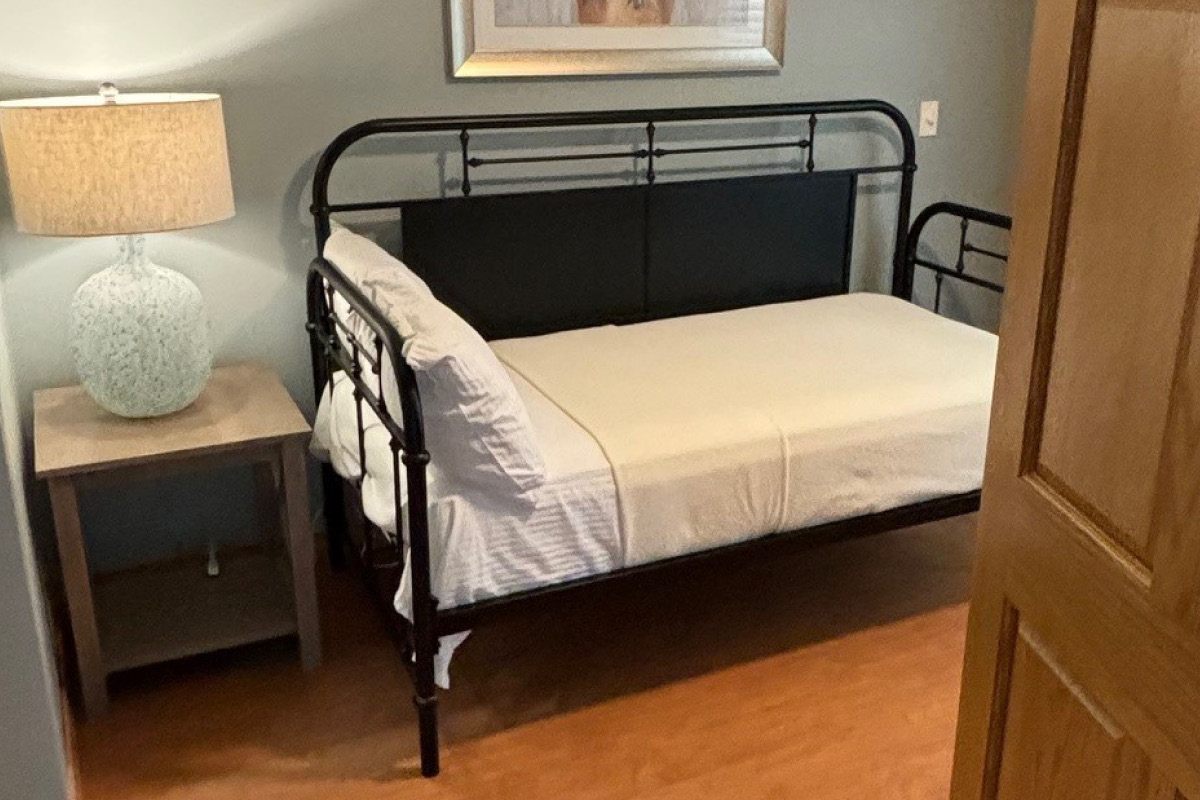
Women create room for respite.
Jan Kiley is a proud Carle Health baby, who’s supported many philanthropic initiatives over the years, including the Women’s Legacy Circle (WLC). In 2024, Jan made her biggest gift yet, supporting several programs, including the WLC Legacy Grant. Thanks to Jan and our WLC members, a new Dayroom at the Carle Auxiliary Guest House will provide those with a loved one in Carle Foundation Hospital a cozy space to get away for a hot shower, short nap or maybe a quick load of laundry. A big thanks to Jan and our WLC members who made this possible. Visit the Women's Legacy Circle page on carle.org to become a member.
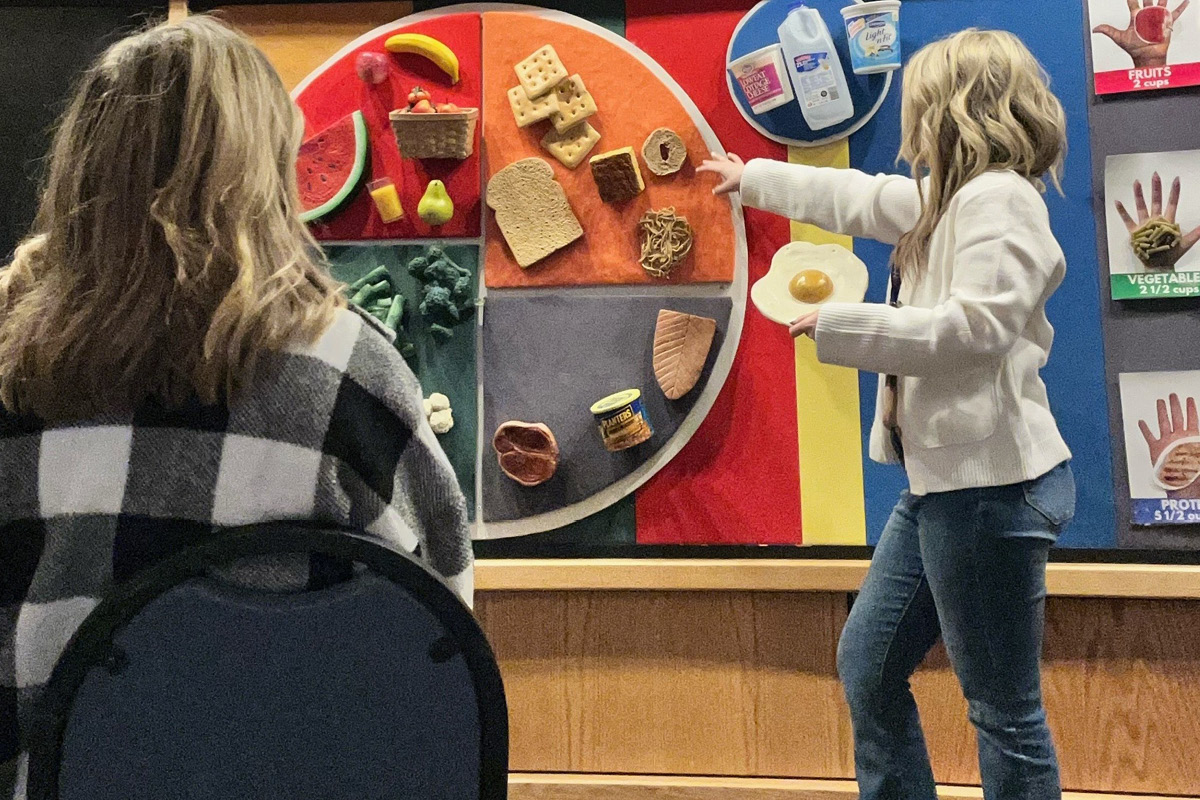
Putting Peoria Adolescents on the Road to a Healthier Life
As a health education specialist at Hult Center for Healthy Living, Betsy Ayers has seen a lot of great initiatives in the Greater Peoria area. But the Adolescent Health Empowerment Program (AHEP) is one of her favorites, because of its power to transform lives.
“Adolescence is an incredible season of growth physically, mentally and emotionally, and the choices made in these years can shape a lifetime,” Ayers said. “We were finding that many young people were entering adulthood without the tools and confidence to manage their health and prevent the chronic diseases we see in our community.”
AHEP is working to change that, thanks to a $90,000 grant made possible in part by unrestricted gifts to Carle Health Greater Peoria. The program strives to improve health outcomes, access to care and health literacy among Greater Peoria adolescents, using a wide range of tools. These include classroom education; one-on-one health coaching for those at risk of chronic health issues; and training to help local medical students and residents deliver adolescent-friendly, culturally competent care. The main goal, however, is equipping students to navigate their own healthcare needs.
Started by a state grant in 2018, AHEP has already helped over a thousand students. And Ayers can tell you many of their stories, like the boy who entered the program because he was at risk for diabetes but became concerned about his heart. “We were able to send him to a cardiologist and ruled out some scary things,” Ayers said, all because he gained the confidence to advocate for himself.
In another instance, a health coach realized a student was constantly tired at school because the inflatable mattress she was using as a bed had popped and her family couldn’t afford to replace it. “We connected her with another organization and had a new bed delivered,” Ayers said. That simple gift will not only improve her immediate health, but also help her focus on her studies, which could impact the trajectory of her life.
AHEP is an invaluable resource for at-risk adolescents like these. And it’s just one example of how donations to the Greatest Needs Fund at local Carle Health hospitals are making a difference, taking care out of the hospital and into the communities we serve.
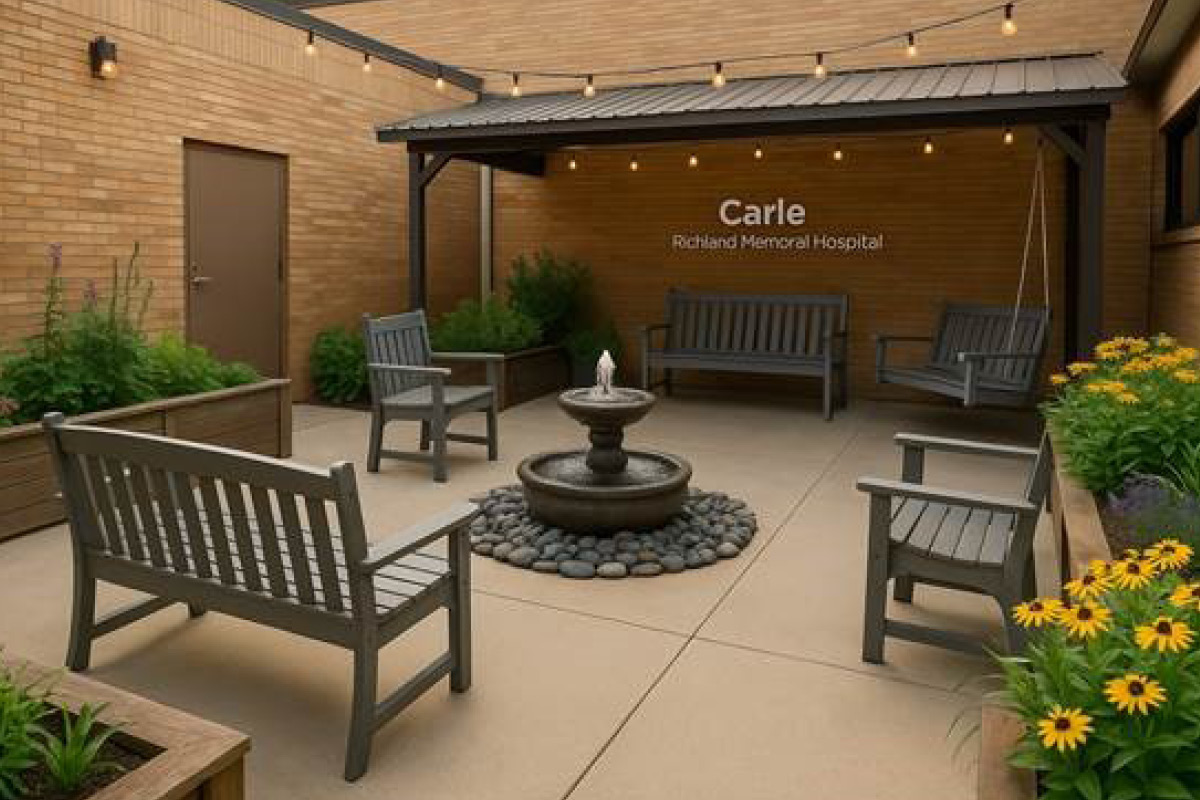
Taking Care of Our Carle Richland Caregivers
If you’ve ever stepped outside a hospital on a sunny day, you know how healing nature can be. Bright lights give way to blue skies and calming breezes that help melt tensions away. Research shows that access to green spaces reduces stress, improves emotional recovery, and enhances focus and job satisfaction in healthcare workers. And team members at Carle Richland Memorial Hospital will soon know exactly what that feels like.
“Even when you love your job, working at a hospital can be stressful,” says Sara Buehnerkemper, director of Ancillary Services at Carle Richland. “You’re always worrying about your patients. So having a place where you can get away occasionally, just to rest and reset, is really important.”
In August, the Greatest Needs Committee at Carle Richland awarded $16,500 in grants to support several projects in the Olney Service Area. A significant part of that will help create the new green space, which will offer outdoor seating, native perennial landscaping and a water feature designed to foster a calm, relaxing environment.
The hospital’s Facilities, Auxiliary and Food Services teams are helping facilitate the multiphase project, which aims to be completed by spring 2026. Once it’s operational, Carle Richland Auxiliary volunteers and students from area schools will help with routine maintenance.
According to Buehnerkemper, it’s ultimately patients who’ll benefit most – by receiving care from team members who are centered, focused and ready to take on the challenge of the day.

Make your 2025 gift to Carle Health count.
New tax laws start in 2026, so giving this year can mean bigger benefits for you and more impact for Carle Health. Smart ways to give:
- Cash gifts: Deduct up to 60% of your income. Donate at carle.org/give.
- Donate stocks: Avoid capital gains tax.
- IRA gifts: If you’re 70½+, give directly and lower your taxable income.
- Businesses: Give in 2025 to avoid stricter rules next year.
Tip: Make sure your gift is received by December 31, 2025.
Visit legacy.carle.org/new-tax-law to learn more about the new tax law. Your generosity helps Carle Health advance care and research in our community. Contact our team to learn more or make your gift today.
This is intended for informational purposes. Please consult your tax advisor or attorney regarding your specific situation.









